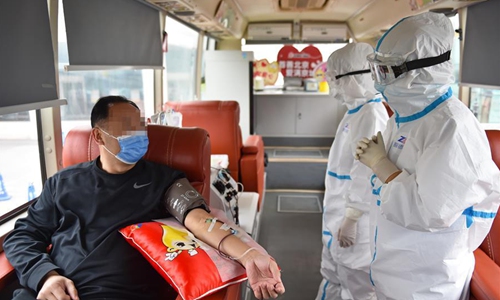HOME >> CHINA
Plasma cure advised for more countries
By Yu Xi and Leng Shumei Source:Global Times Published: 2020/3/3 20:43:42 Last Updated: 2020/3/3 22:10:15
Donation of blood still lacking as many recovered patients fear health risks

A recovered COVID-19 patient donates plasma on a blood donation bus in Beijing, capital of China, Feb. 27, 2020. Two recovered patients of novel coronavirus infection donated plasma in Beijing on Thursday. (Xinhua/Chen Zhonghao)
Other countries can learn from China's experience in using products made from recovered COVID-19 patients' plasma to treat other critical patients, experts said, but currently only a small percentage of recovered patients in China have donated their plasma out of health concerns.Plasma products from recovered patients are believed to be the most effective treatment for the disease, because there are no special drugs or vaccines so far to handle it.
As the daily confirmed cases outside China have exceeded those in China for days - 1,598 new confirmed cases outside China compared with 206 new cases in China on Monday - some netizens wonder if China can send some plasma products to help foreign countries treat critical patients as 47,204 have been discharged from hospitals in the country.
But Yang Zhanqiu, deputy director of the pathogen biology department at Wuhan University, deemed the move as being of low possibility as China still lacks such products, not to mention giving them to other countries.
"But other countries can learn from our experience to use this method on COVID-19 patients," Yang told the Global Times on Tuesday.
Chinese health authorities and governments have been encouraging recovered COVID-19 patients aged 18-55 to donate plasma as the donor pool is still comparatively small, while the number of cured patients is growing.
As of Tuesday, 12 out of 294 recovered patients had donated blood plasma in Shanghai, a staff member of the China National Pharmaceutical Group who is working on collection of recovered COVID-19 patients' plasma in Shanghai, told the Global Times on Tuesday on condition of anonymity.
Across the country, there have been 544 recovered patients donating plasma that has been made into plasma products used on 245 patients, according to authorities.
The Chinese Red Cross Society has established a special fund to award each plasma donor 3,000 yuan ($430), according to its website.
"Despite the cash award, many people are reluctant to donate plasma soon after recovery as they worry it will hurt their health and cause them to be infected with COVID-19 again," Yang said.
But the worry is unnecessary, according to Yang. Recovered patients will not be infected again for years, but the effectiveness of the anti-bodies in their plasma would decline six months after recovery, Yang said, calling for more recovered patients to donate plasma within three months after recovery when the effectiveness of the anti-bodies is high.
Strict processing procedures may also be a reason for the slow provision of plasma products. The Global Times learned from the China National Pharmaceutical Group that it takes at least a week from collecting plasma to preparing the products that can be used on COVID-19 patients.
The testing for plasma is quite strict. "We will do many virus tests on the plasma of recovered patients, such as AIDS, hepatitis B, and syphilis, to ensure that the plasma is completely safe before being used for treatment," the person said, noting there is also a blood type match requirement.
Recovered patients are required to undergo a 14-day quarantine and take a test to confirm they have turned negative for the virus before they can donate plasma.
On average, 400 milliliters of donated plasma can save two or three patients in serious condition.
A good sign is more and more recovered patients are donating plasma.
"All the medical staff have sacrificed a lot to treat patients like me, I also want to contribute a little," a recovered COVID-19 patient surnamed Yin told the Global Times.
"All for one and one for all," Yin said.
Yin went to the hospital for a further check on Monday and was told that he was in a good, recovered condition. "After learning that my condition is good for donation, I decided to donate my plasma."
Another recovered COVID-19 patient surnamed Wang also thanked all the medical staff and told the Global Times that he hoped his donated plasma could help other patients.
Wang and Yin each donated 200 milliliters of plasma on Tuesday.
Posted in: SOCIETY